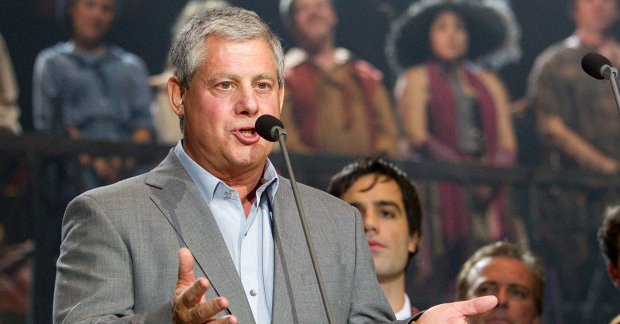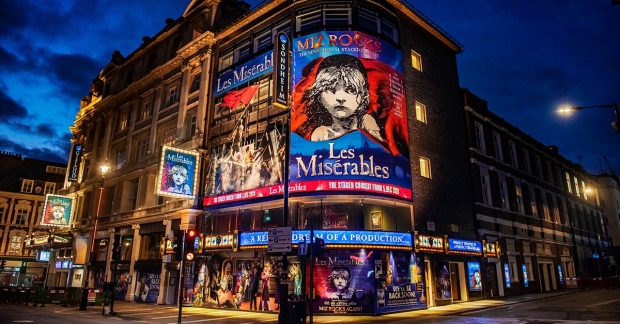Cameron Mackintosh on government insurance plans: 'Commercial theatre has once again been ignored'
The statement is in response to yesterday’s unveiled plans

© Dan Wooller
Heavyweight producer Cameron Mackintosh has given his thoughts on last night's announcement regarding a new state-backed insurance system to help mitigate risks during the pandemic.
While seen as a positive step, many highlighted key flaws in the current arrangements that will mean the scheme does not aid theatre events in a way many producers have requested over the last 16 months.
Mackintosh released a statement this morning saying: "Welcome though the news is that the live event and music industries are finally being offered an insurance scheme, backed by the Treasury in partnership with Lloyds that will enable this important sector to plan their programmes for a year with greater certainty from this September, it is shocking that whilst theatre has been included, the specific needs of the commercial theatre have once again been ignored. In contrast the TV and Cinema industry has enjoyed government backing over this last year and is consequently thriving.
"This latest insurance scheme is unsuited to the way the theatre works, where we normally stage eight shows a week for 52 weeks a year. Music and business events are usually one offs lasting at most a few days. Yet the theatre is the spawning ground for much of the talent that fuels the live event, TV and Cinema sectors that the government are welcoming with open arms as more studios are being built in the UK.
"The prohibitively expensive insurance on offer explicitly excludes some of the protection the theatre desperately needs, namely cancellation of performances caused by illness or enforced isolation and the negative effects of the reintroduction of limited capacities which would make most shows financially unviable. It would help even if insurance covered any shortfall of running costs (not profits). There is also no contribution on offer to help mitigate the tens of thousands of pounds spent on Covid protection that the big shows are each spending every week to keep artists staff and audiences safe.
"We desperately need the current five per cent VAT rate to be extended at least till next spring to help us through till next Easter when hopefully everyone will be vaccinated, and the pandemic will have run its disruptive course."
The producer has been running a concert production of Les Misérables for the last few months, initially with socially distanced audiences. He also reopened The Phantom of the Opera this week at Her Majesty's Theatre.
"We employ many thousands of artistes and freelancers who have had an exceptionally tough 18 months and are currently now involved with us ramping up our productions to get our industry and the West End going again. The public are responding very encouragingly to our efforts to reopen by booking in large numbers to see theatre again in London – but not in the regions at the moment. All this is at risk if we are forced to close again through no fault of our own through an inadequate insurance scheme.
"The Treasury has earned billions from us over the years, and will do again if we survive, yet aside from furloughing the comparatively few building based staff, they continue to exclude us from the protection and rebuilding programmes afforded to others. There IS no business like show business and it's way past time the government helps us ensure that the show not only goes on but stays on.

© Matt Crockett
In a similarly skeptical statement, the Society of London Theatre and UK Theatre issued a joint statement saying: "Yesterday's announcement of a government backed insurance scheme for the live performance and events sectors, which is accessible also to theatres and productions is a welcome demonstration of the need for insurance to protect against the severe impacts of the pandemic. These have led to costly cancellations of theatre productions, and a major inhibition to producers, venues, and external investors from making the commitments necessary to bring our world leading theatre sector back to normal levels of activity, with all the employment which that creates, right the way across the UK.
"Theatre generates £1.4bn in revenue annually and we estimate that as a sector our total economic impact including to the hospitality, travel and the tourism markets, coupled with the vibrancy theatre brings to our city centres, is worth at least treble this number to the economy as a whole. We also provide critical international earnings as our high quality productions are exported around the world. The sector will not be able to flourish and return to pre pandemic levels without an effective insurance scheme in place, that provides cover for Covid-19 related risks.
"Currently commercial insurers are unwilling to offer such crucial cover without government backing. We therefore welcome government intervention to help plug the gap left by this market failure – especially in relation to possible future national or regional lockdowns.
"However today's proposal addresses only some, and not all, of the major risks that theatre faces. Self-isolation regulations have been forcing the closures of shows at short notice. Social distancing audience number caps have been a constant burden to an industry which requires high audience occupancy levels to be economically viable. The threat of their possible reimposition represents a major risk, that we need to obtain insurance cover for – especially if larger, high cost productions are going to resume at normal levels. Theatre productions need long term sustainable cover for shows running daily over a considerable period of time. These risks and requirements are not addressed properly by the proposal. For any scheme to be effective it has to be comprehensive, and it also has to be affordable.
"We recognise the considerable engagement that has been made by DCMS and HMT, over the past year, in working closely with the theatre sector on the issue of insurance. It is important that we continue those negotiations and discussions as we work through the specific detail of the proposal announced today, but also to find ways to mitigate cover to include more of the risks that the sector is facing due to the pandemic, and to making the costs involved significantly more viable."













